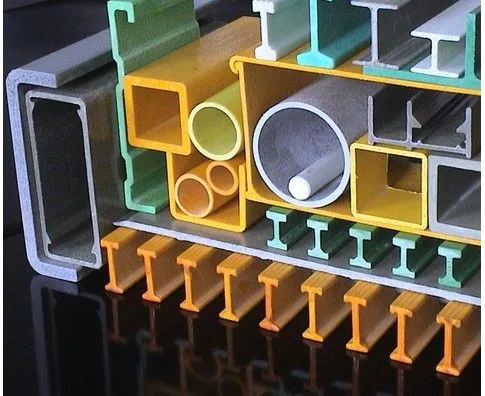Introduction
Choosing the right structural material is no longer a simple steel-vs-aluminum debate. FRP GRP pultruded profiles—continuous fiberglass-reinforced shapes made by the pultrusion process—are rewriting the rules by combining high mechanical performance with low weight and zero corrosion. The global fiber-reinforced polymer (FRP) composites market was valued at USD 98.5 billion in 2023 and is expanding 6.5 % annually through 2030—a growth curve driven largely by construction and infrastructure projects looking for durable, lightweight alternatives.

frp grp pultruded profiles
What Makes FRP GRP Pultruded Profiles Different?
Consistent, one-piece construction: Continuous fibers are pulled through a heated die, creating uniform cross-sections with virtually no weak points.
Customizable performance: Resin choice, fiber orientation, and additives can be tuned for fire resistance, electromagnetic transparency, or extreme temperatures.
Dimensional stability: Unlike hot-rolled steel or kiln-dried timber, pultruded profiles don’t warp from residual stresses or moisture swings.
Key Physical Properties
| Property | FRP GRP Pultruded | Structural Steel (A36) | Benefit |
|---|---|---|---|
| Density (kg/m³) | ~1,800 | 7,850 | Up to 75 % lighter, reducing transport and lifting costs |
| Tensile strength (psi) | 70,000–100,000 | 58,000 | Comparable strength at a fraction of the weight |
| Corrosion resistance | Excellent | Requires coatings | Eliminates repainting, sand-blasting, cathodic protection |
“Pultruded fiberglass profiles often surpass steel on a strength-to-weight basis while delivering unbeatable corrosion resistance,” notes composites manufacturer Tencom.
Dollars and Sense: Up-Front Cost vs. Lifetime Value
Up-Front Savings
Shipping & handling: A flat-bed truck that carries 10 t of steel can haul 40 t of FRP shapes, slashing freight bills.
Site equipment: Lightweight profiles allow smaller cranes or even manual placement for mezzanine rails, ladder platforms, and walkways.
Lifetime Savings
A 50-year life-cycle assessment of transmission towers found that FRP solutions delivered 52 % lower total cost than steel, thanks to zero painting cycles and reduced right-of-way requirements.
Rule of thumb: If your project budget allocates more than 20 % to corrosion protection and repainting, FRP often wins the long-game.
Performance & Durability in Harsh Environments
Chemical plants: Isophthalic or vinyl-ester resins shrug off acids and alkalis where galvanized steel quickly pits.
Coastal bridges & piers: Salt spray corrodes steel within 3-5 years; FRP maintains full capacity with no cathodic current.
Utility structures: Electromagnetic transparency keeps antennas unobstructed, unlike aluminum.
Fatigue & Impact
Pultruded composites dissipate energy through the polymer matrix, offering superior fatigue life compared to welded steel assemblies prone to crack initiation at joints.
Installation & Maintenance Advantages
Fast drilling & cutting—standard carbide blades, no welding or hot-work permits.
No heavy lifts—crews of two can hand-carry 6 m stair stringers.
Predictable scheduling—weather-immune components arrive pre-finished in project colors.
Minimal inspections—paint meters, ultrasonic thickness gauges, and rust remediation budgets disappear.
Case study results from industrial grating retrofits show labor man-hours trimmed by up to 30 % when swapping steel with FRP pultruded platforms because crews skip surface prep, priming, and touch-ups.
Sustainability and ESG Metrics
20 % lower CO₂ emissions across the cradle-to-grave lifecycle versus steel towers
Zero heavy-metal runoff or VOCs from paint systems
Often qualifies for LEED credits (MR 2, IEQ 4) under “innovative materials”
Typical Applications & ROI Snapshots
| Sector | Traditional Material | FRP GRP Advantage | Payback Period |
|---|---|---|---|
| Chemical plant walkways | Galvanized steel grating | Non-sparking, chemical-proof, no paint | 2–3 years |
| Cooling-tower structure | Redwood timber | Termite-proof, water-saturated resistance | < 2 years |
| Pedestrian bridge deck | Concrete | 80 % lighter, rapid overnight install | 4–5 years |
Is FRP GRP Pultruded Right for Your Project? Quick Checklist
❏ Corrosion or chemical exposure expected?
❏ Weight restrictions on foundations or roofs?
❏ Limited site access for heavy cranes or welding rigs?
❏ Desire to trim OPEX or maintenance staffing?
If you tick ≥ 2 boxes, FRP GRP pultruded profiles warrant a detailed cost-benefit analysis.
Conclusion & Next Steps
FRP GRP pultruded profiles offer an unmatched blend of lightness, strength, corrosion-proof durability, and whole-life cost savings that traditional steel, aluminum, or timber struggle to match. Projects ranging from industrial platforms to architectural facades are capitalizing on paybacks as short as two years, all while meeting aggressive sustainability targets.
👉 Contact Us today to speak with our team of experts and get a free consultation!




























